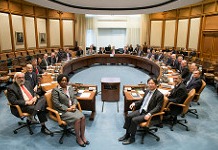CPI FINANCIAL
by Georgina Enzer
On January 23, 2017, the Executive Board of the International Monetary Fund (IMF) concluded the Article IV Consultation with Morocco.
Morocco’s macroeconomic conditions have improved since 2012, but growth has remained sluggish. In 2016, growth slowed due to a sharp contraction in agricultural output and subdued non-agricultural activity. The unemployment rate decreased to 9.6 per cent in Q3 2016 while youth unemployment remains high at 21.8 per cent. Headline inflation (year-on-year) reached 1.6 per cent, reflecting higher food and energy prices.
External imbalances have fallen substantially since 2012, even though the current account deficit increased to 2.9 per cent of GDP in 2016, against 2.2 per cent in 2015. Strong manufacturing and agriculture exports, and a rebound in tourism and remittances, have more than offset the impact of increased equipment and food imports and low phosphate prices. As a result, and with continued robust foreign direct investment (FDI), international reserves strengthened to about seven months of imports.
Fiscal consolidation has continued with a deficit down from 4.4 per cent in 2015 to about four per cent of GDP against the objective of 3.5 per cent of GDP for 2016. This reflects resilient tax revenues and well contained current expenditures, which offset the grant shortfall of about 0.3 per cent of GDP and allowed for an increase in investment spending.
Banks are well capitalised and have stable funding, but nonperforming loans are rising and credit concentration risks, while declining, are still elevated. The expansion of Moroccan banks into Sub-Saharan Africa opens new channels of risk transmission, but cooperation with host country supervisors is intensifying and supervisory requirements for cross-border activities are being upgraded.
Morocco’s medium-term prospects are favourable, with growth expected to rebound to 4.4 per cent in 2017 and reach 4.5 per cent by 2021. However, risks remain substantial, and relate mainly to growth in advanced and emerging countries, geopolitical tensions in the region, world energy prices, and global financial market volatility. Stronger medium-term growth will hinge on continued implementation of comprehensive reforms with regard to labour participation and labour market efficiency, access to finance, quality education, public spending efficiency, and further improvements to the business environment. Continued poverty reduction, and lower regional and gender disparities, will also be crucial to achieve higher, sustainable and more inclusive growth.
Executive Board Assessment
Executive Directors commended the authorities for their sound macroeconomic policies and reforms, which have helped reduce domestic and external vulnerabilities, enhance the fiscal and financial policy frameworks, and increase economic diversification. Directors noted that, while the medium‑term outlook is favourable, risks remain elevated. Against this backdrop, they welcomed the authorities’ continued strong commitment to sound policies, and encouraged them to sustain their reform efforts to further reduce vulnerabilities and promote stronger job creation and more inclusive growth.
Directors commended the continued progress made in fiscal consolidation, particularly the recent containment of current spending, the energy subsidy reform, and the reform of the public pension system. Going forward, they encouraged the authorities to gradually reduce the level of public debt over the medium term while preserving pro‑growth and social spending. Directors agreed that efforts should focus on accelerating tax reforms to broaden the tax base and on careful and well‑planned implementation of the fiscal decentralisation to mitigate any related fiscal risks. Directors also encouraged the authorities to reform the civil service to help contain the public wage bill.
Directors endorsed the currently accommodative monetary policy stance in the context of moderate inflation and the nascent credit growth recovery. They supported the authorities’ intention to move gradually to a more flexible exchange rate regime and a new monetary policy framework, which will help preserve competitiveness and better insulate the economy against shocks. In this regard, Directors concurred that the conditions for a successful transition in 2017 are in place. Directors also encouraged the authorities to submit to parliament the draft central bank law, which will strengthen Bank Al‑Maghrib’s (BAM) independence and expand its roles in the promotion of financial stability and inclusion.
Directors welcomed that the banking sector remains sound and well capitalised, and stressed that rising non‑performing loans, credit concentration risks, and the expansion into Sub‑Saharan Africa require continued monitoring. They also welcomed BAM’s continued efforts to strengthen the financial regulatory and supervisory framework in line with 2015 Financial Sector Assessment programme recommendations, including ongoing advances on cross‑border bank oversight, more risk‑based and forward looking supervision, a stronger macroprudential policy framework, and efforts to strengthen supervisory resources in view of expanding responsibilities.
Directors emphasised the importance of sustained implementation of structural reforms to promote higher and more inclusive growth. They recommended continued efforts to improve the business climate, particularly for small and medium‑sized enterprises, including by enhancing their access to financing. Directors also called for improved labour market regulations as well as increased efficiency of public spending on education and vocational training that better addresses skill mismatches, which will be critical to bolster growth, reduce unemployment—especially among the youth—, lower gender gaps, and strengthen competitiveness. Directors welcomed ongoing efforts to reinforce the governance and oversight of public enterprises, and looked forward to further progress in implementing the national strategy to fight corruption.







